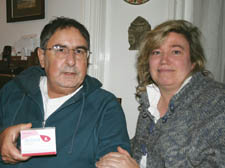|
|
 |
| |

David Rodgers and his partner Petra Dando |
Drug decision could claim patients’ lives
Eric Low, who founded the charity Myeloma UK, follows up last week’s New Journal special report on the cost and availability of cancer drugs with a call for urgent action
LAST week the Camden New Journal reported David Rodgers’ skirmish with his Primary Care Trust for the right to be given the drug Revlimid (lenalidomide) to treat his myeloma, cancer of the bone marrow.
After eight months the primary care trust eventually folded and agreed to fund Revlimid for Mr Rodgers. This roughly coincided with the National Institute for Health and Clinical Excellence (NICE) releasing its draft recommendation that Revlimid (lenalidomide) should not be made routinely available on the National Health Service.
NICE states that its interpretation of the data casts uncertainty over whether Revlimid would be a cost-effective use of NHS resources.
This is despite acknowledging the clinical effectiveness of the drug both in terms of improving outcomes and increasing survival for people with relapsed myeloma.
Regrettably, this is a common enough story. In the current drugs approval system it is a reality that cost-effectiveness can outweigh clinical importance.
Since NICE’s inception in 1999 its decisions have been fraught with controversy.
I accept that the introduction of new drugs should be subject to appropriate scrutiny and that the NHS, accountable to the taxpayer, clearly needs to make careful decisions about healthcare expenditure. However, there must be further capacity in the modern NHS for new and improved technologies.
A failure by NICE to reconsider its draft recommendation on Revlimid will make it increasingly difficult for patients to get access to this important advance in the treatment of myeloma, and may mean that some patients will die sooner than they should.
That NICE and the manufacturer of Revlimid cannot reduce the uncertainty around the data for a treatment that has such an impressive body of evidence supporting it is beyond me.
Last week also saw the government accepting all recommendations from a report by Professor Mike Richards, the National Cancer Director, calling for a raft of measures to allow patients greater access to life-extending treatments.
Specifically, patients are to be allowed to pay for treatments not available on the NHS without losing their entitlement to NHS care, but there is to be no burden on the NHS in doing so.
Therefore the paid-for treatment will need to be administered in a private setting.
In order to minimise the numbers of patients seeking to buy treatments that the NHS will not pay for, the government announced two further measures that will be introduced: more flexible pricing schemes with drug manufacturers; and NICE will be more flexible in the way it appraises expensive drugs for rarer and more severe diseases.
Myeloma UK considers Professor Richards’ report to be a mixture of good and disappointing news.
With regard to NICE reform, I am pleased that some of what Myeloma UK has been campaigning for over the past few years will be realised.
We have long argued that NICE’s appraisal methodology is too rigid and that there must be an onus on the pharmaceutical industry to work with the government effectively to increase the value for money that new treatments offer to the NHS.
However, a number of concerns remain. Myeloma UK considers that one of the crucial issues remains unresolved.
What about patients who simply cannot afford to pay?
Even with new measures to support better availability of treatments on the NHS, inevitable instances will remain where a new expensive drug, such as Revlimid, is not available on the NHS.
The financial and emotional challenge involved in deciding whether to pay privately for an expensive drug has not been tackled. I am also concerned that allowing co-payments may act as a disincentive for primary care trusts to approve funding for treatments.
Much of the proposed reform is a definite step in the right direction. But, for the reasons I outline above, it is extremely important that NICE reconsiders its draft recommendation on Revlimid so that this highly effective treatment is routinely available to those who need it.
• |
 |
|
| |
| |
| |
| |
|
 |
|